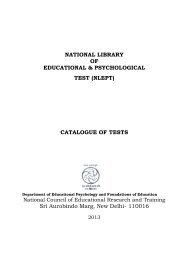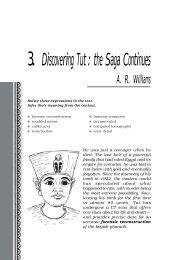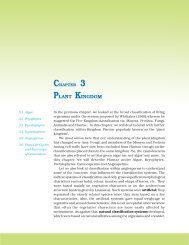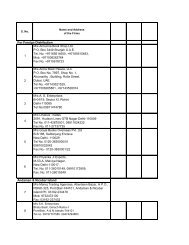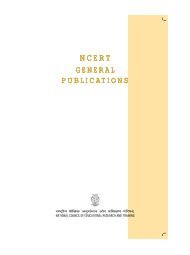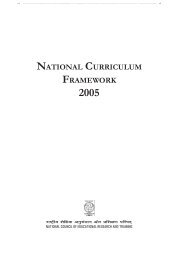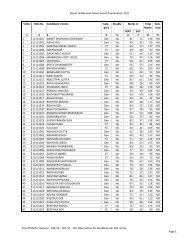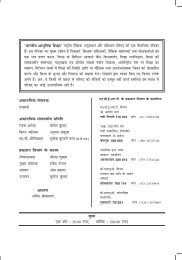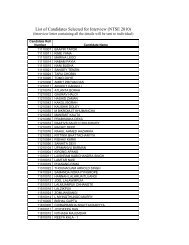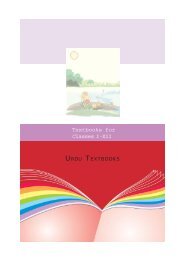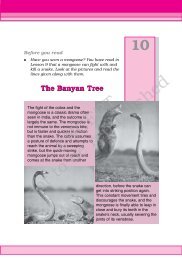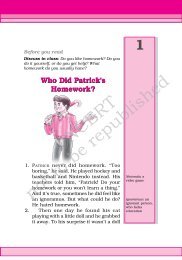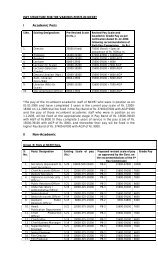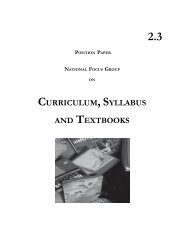Annual Report - National Council Of Educational Research And ...
Annual Report - National Council Of Educational Research And ...
Annual Report - National Council Of Educational Research And ...
You also want an ePaper? Increase the reach of your titles
YUMPU automatically turns print PDFs into web optimized ePapers that Google loves.
NCERT<br />
80<br />
collected. It consists of five chapters namely; i.) Our Vision, ii.) Art Education, iii.)<br />
Indian Perspective, Initiatives and Achievements in the field of Art Education, iv.)<br />
Road Ahead and v) Success Stories from the Field. The <strong>Report</strong> was presented in<br />
the second UNESCO World Conference on Art Education, Seoul, South Korea by<br />
the Indian delegation, led by Smt. Purandeshwari, Minister of State, MHRD,<br />
Government of India.<br />
Copies of the report were distributed among official representatives of UNESCO<br />
and its member countries. It was highly appreciated and attracted discussions<br />
and consultations. The report has been placed on the DEAA website for wider<br />
use of the same.<br />
Development of Training Package for the Primary and Upper Primary<br />
Teachers on Arts Education<br />
Implementation of art education in schools as envisaged by NCF-2005, depends<br />
a great deal on the teachers involved in the teaching-learning of the subject.<br />
They are in need of adequate training on appropriate teaching-learning methods<br />
and of good quality instructional as well as reference materials. The training<br />
package is multi-media in nature, supported by number of video productions.<br />
Its main focus is on ‘Integration of Arts with Other School Subjects’ with an<br />
objective to educate in-service teachers of primary classes.<br />
The try-out edition of training package is complete. It consists of seven<br />
modules and provides knowledge and training on: what is arts education? what<br />
all comes under arts education? methods, materials and techniques of different<br />
art forms, understanding the ‘Child ‘and ‘Child Art’, why art education? arts<br />
education for inclusive education, integration of arts with other subjects, arts<br />
and ice-breakers, evaluation in arts education, arts in day-to-day activities of<br />
the school, appreciation of arts, role of art and craft museums in education and<br />
role and responsibilities of a teacher/facilitator in teaching of arts at<br />
primary level.<br />
Target group of the training package are teacher educators and teachers of<br />
primary level of education. To make it need specific, the methodology of focus<br />
group discussion with teachers teaching Classes I-V and teacher educators of<br />
DIETs were used. Need based modules; keeping pedagogic convenience of the<br />
user in view was developed on the basis of Frequently Asked Questions (FAQs)<br />
by Teachers and Teacher Educators. The modules are designed to cater to the<br />
needs of the trainer/facilitator as well as the trainee. It is interactive in nature<br />
and provides space for exploration and addition at source. There are videos and<br />
power point presentation to make every module simple and effective. It also<br />
provides guidelines for Mass Training on ‘how to use’ the training package.<br />
Translation (Hindi Version) of the Textbooks for Visual Arts (2), Graphic<br />
Design (1) and Heritage Crafts (1)<br />
The Department has developed and introduces two new subjects of Heritage Crafts<br />
and Graphic Design and also developed textbooks for the senior secondary stage.<br />
The Hindi translation of these books have also been prepared and sent for publication.<br />
Since the textbooks in these subjects have been made for the first time and in<br />
absence of a standard technical dictionary it has been a tough task to make the<br />
Hindi version print worthy. The translation of the textbooks were vetted in<br />
workshops where authors, subject experts, translators and teachers participated<br />
and discussed the terms and phrases. The department has also developed the<br />
<strong>Annual</strong> <strong>Report</strong> 2010-11



